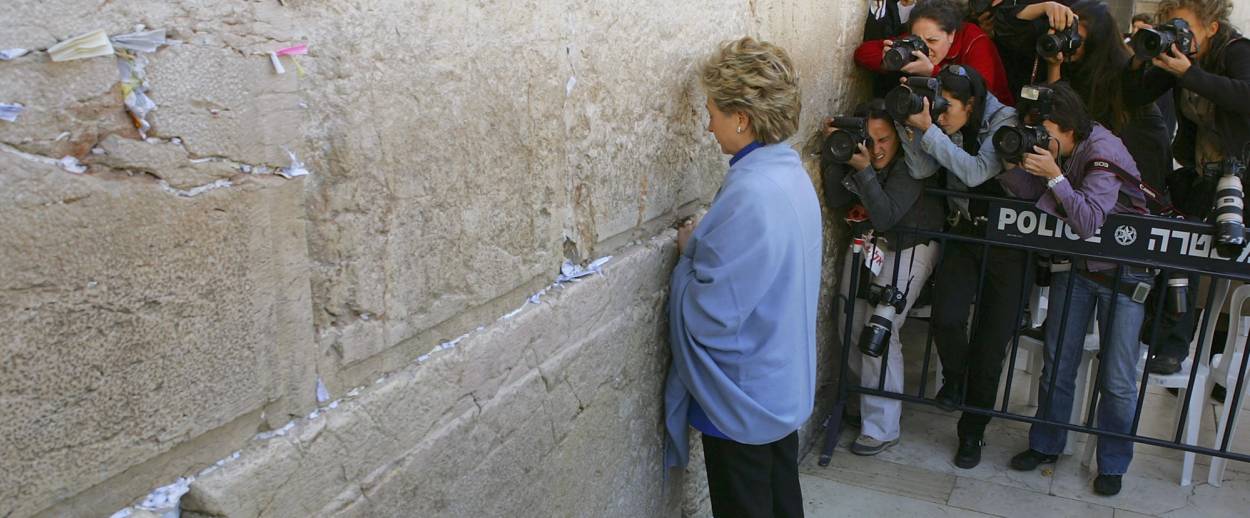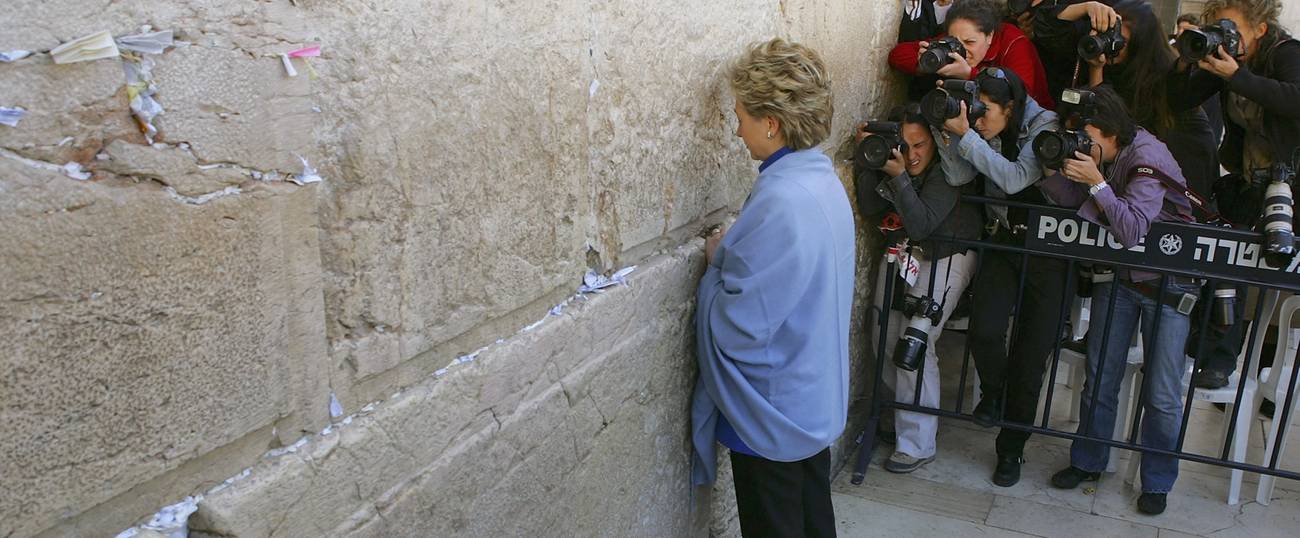What We Can Learn About a Hillary Clinton Presidency From the Experience of Women Rabbis
For one, not to underestimate the impact of her just getting there




This fall, Hillary Clinton may very well be chosen to be our nation’s biggest boss. If it happens, the historic nature of this event is likely to impact people of all genders in a lot of different ways, both consciously and not. How will America deal with a female commander-in-chief? What might be in store for Clinton, and for us, if she wins the election? Perhaps another sector still grappling with patriarchal notions of leadership can illuminate some of these questions. So: What can we learn about having a female president from women who’ve broken the stained-glass ceiling?
I polled a number of friends—female rabbis, male rabbis, and congregant-types of many genders—to hear about their experiences of female rabbinic leadership. I didn’t tell most of them that I was working on a piece about the possibility of a woman POTUS. It didn’t surprise me that a lot of the things people mentioned are things I’ve had to deal with myself, but as the answers came in, it was hard to miss the parallels to the criticism that Clinton’s faced over the years, too.
Excessive attention to gender presentation, including a refusal to take a leader seriously if she’s read as too “feminine” and criticism of her whole personhood if she’s read as too “masculine”? Check. Inappropriate discussion of weight and body shape? Check. Gender tokenism (“We tried having a woman rabbi once, that didn’t work out.” “We couldn’t possibly have two women on the ticket!”)? Check. Dismissal of an issue as simply a “women’s issue” if a woman leader is raising it? Check.
Issues of authority, power, and respect are complicated for women in leadership. To take a pretty minor example from my personal experience: My first job after ordination was at Tufts University, at the Hillel where Rabbi Jeffrey Summit has been executive director for decades. He’s smart, energetic, enthusiastic, gray-haired and bearded, and known to every single Jewish (and non-Jewish) student on campus as Rabbi Summit. The most frequent question I encountered during my first year on campus by those same students? “Can I call you Rabbi Danya?” Often they wouldn’t even ask. Sometimes they just called me Danya.
True confession: I debated whether or not I should even share this story, even though it’s a microaggression that many, many of my female colleagues also deal with all the time. Of course, most rabbis I know, including myself, are happily referred to as different things in different contexts; the issue here was the leap in assumptions that the students made about how it was appropriate to refer to the female rabbi, even with a strong honorific precedent for the male rabbi. And yet, I wasn’t sure if it was blatant enough to convince the skeptics and scoffers. (But let’s face it: Much of the crap women leaders face comes in the form of microaggressions—almost too subtle to name, but effective nonetheless). Because we’re all supposed to be complicit in the story that gender doesn’t matter, not one bit—and when we breach that unspoken agreement, our stories have to be indisputably clear, beyond reproach.
But gender matters. And it’s the gap between the reality on the ground and the story that so often gets told about how sexism doesn’t exist (or isn’t relevant in this situation, whatever “this situation” is) that makes talking about this so complicated.
Those of us who are women leaders manage somehow to not be taken as seriously as our male counterparts and at the same time are somehow expected to go above and beyond on every front, whether in displaying our business acumen or in the time we devote to hand-holding. When my friend Rabbi Andrea London was interviewing for the senior rabbi position at the synagogue where she had been serving as the associate rabbi, a few people complained to the search committee that she hadn’t cared for them to the degree that they would have liked their time of need. London asked one of her female congregants about this, and was told, “I wouldn’t have expected more attention from Rabbi Knobel, but with you being a woman and all.”
It was striking that when I asked about women’s rabbinic authority on Facebook, most people—rabbis and congregants alike—responded to me privately, via email, phone, or direct message, rather than commenting on the original, friends-locked, post. For a lot of us, in different ways, talking about the complexities, ambivalences and, yes, outright sexism encountered by women leaders still feels fraught. Most of what people wanted to tell me didn’t involve telling a story in public about someone who’s currently their congregant—even general comments or stories about some unnamed rabbi they knew about were DM’d, with exhortations to please check in before quoting the respondent by name.
It feels like a lot of us are somehow expected to behave in public as though we live in a postpatriarchal world, in which gender equality is already a fait accompli—despite the obvious fact that, while the road is increasingly drivable, it’s still under construction and full of open potholes. Because talking about these issues even in a general way can open us up to being perceived as complainers or whiners, or worse—as the mentions of any even moderately well-known feminist on Twitter can attest.
Rabbi London mused, “Men are given authority immediately and women have to prove their competence and intelligence.” She feels taken seriously in her role now, as a senior rabbi, but it took time; one of the ways she got there, she said, was “by making men my allies. … When I have support from men, then I have more legitimacy.” For example, when she was interviewing to become senior rabbi at her synagogue, “having a strong cohort of men support my candidacy was crucial to my getting the job.”
Indeed, I finally got students to use the same language to refer to me that they used for my male colleague by asking him to go out of his way to refer to me as Rabbi Ruttenberg whenever he spoke about me in their presence. (Eventually they started calling me RDR—the acronym for Rabbi Danya Ruttenberg—which I found to be a wholly endearing mix of respectful and affectionate.)
“A rabbi has to be accepted by powerful men in the community to be successful,” London reflected. “If a rabbi is popular amongst women, but not men, that’s a death knell.”
***
Hillary Clinton knows all this, even if many of her critics—and some of her supporters—don’t. And fortunately, 30 years in politics and an emphasis on building relationships has made it possible for her to draw on critical endorsements from men who can help her cause—President Barack Obama and Sen. Bernie Sanders among them. I have no doubt that Clinton will continue to make use of relationship-building as a coalition-building and acceptance-garnering technique—and I have no doubt that, despite this, her leadership style will continue to be misunderstood. Perhaps—until one day, maybe it isn’t.
This too is a chronic problem. “I lead a highly selective fellowship programs for rabbis called Rabbis Without Borders,” said Rabbi Rebecca Sirbu. “Each year a couple of male rabbis come to me and say variations on, ‘Rebecca, the program is great. I am learning so much. Why don’t you speak/teach/lead more? I want to hear your voice.’ In every case, I know that they mean this as a compliment. They want to see me as a leader in the front of the room. I am always curious that they do not see what I do as leadership. At the same time, I hear from the female participants, ‘Rebecca, the program is great. I am so impressed with your leadership skills. You do a great job facilitating the group/managing the speakers/choosing reading/making this a holistic experience’.”
Clinton’s leadership style, too, in some ways could be understood as more “female”: She’s known for listening rather than talking, and for transforming the deep work of her “listening tours” into legislative action. She’s sometimes described as “empathetic,” and is said to “work hard at personal connections.” (Of course, men might be described as being great networkers.) Like Sirbu, many of her critics misunderstand her style as a weakness—if she’s not being charismatic at the front of the room, what on earth could she be doing?
And yet it’s exactly this gap that gives me hope. If it’s true that Clinton’s popularity is higher when she’s holding office, perhaps her ability to offer others the mic will be given more and more positive media coverage, and pave the way for less frontal modes of leadership to be finally understood—even by the most resistant men—as legitimate. If it happens, it probably won’t be a transformation of which anyone is consciously aware. I imagine positive coverage of Clinton, coupled with her emphasis on listening, relationship-building, and a half-female cabinet could simply, slowly but surely, penetrate people’s consciousness, until a different way of doing things just seems normal.
Which isn’t to say that the fact of Clinton’s gender, and what it represents, won’t also manifest in concrete ways. All of us who rabbi while female have moments in which our gender becomes a symbolic access point in good, privileged ways. The examples are myriad, and many of them are amazing and heartbreaking and powerful. My favorite recent one is, in the grand scheme of things, kind of small and sweet—though it also speaks to a deep trust that might not be so small after all. Rabbi Robyn Fryer Bodzin recently got the following text: “S will not be able to make it for her Bat Mitzvah meeting today. She got her period for her first time.” I don’t know what the presidential equivalent of a first-period text might be, but there’s no doubt in my mind that there would be important, boundary-transcending moments if Clinton makes it to the White House. Perhaps they would evoke, in their own way, the iconic photograph of the black child feeling President Obama’s hair, just like his own, and all that it represents to so many little boys like him.
Jaclyn Friedman, feminist activist and host of the podcast Unscrewed, wrote eloquently about growing up as a congregant of Sally Priesand, the first woman ordained by a rabbinical seminary—Hebrew Union College—in 1972. As she watched Priesand in action throughout her childhood, she says, she absorbed some key messages about her own potential. Priesand on the bimah taught her that “women are authoritative. Women are holy. Women do things men tell us we can’t do.”
If seeing a woman in a leadership role at shul can do this, how much more when there’s a woman holding the highest office in the land? Obviously, it matters if that woman is a good, strong, competent leader, but the impact of seeing her there at all shouldn’t be underestimated.
***
Like this article? Sign up for our Daily Digest to get Tablet Magazine’s new content in your inbox each morning.
Rabbi Danya Ruttenberg, named by Newsweek as one of 10 “rabbis to watch,” is author ofNurture the Wow: Finding Spirituality in the Frustration, Boredom, Tears, Poop, Desperation, Wonder and Radical Amazement of Parenting.